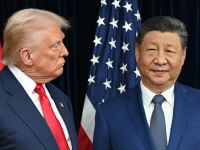Both anthrax attacks reported outside the United States proved to be false alarms Wednesday but the news did little to diminish the growing bioterrorism panic as more spores came to light in Washington.
A letter which Kenyan authorities had said contained anthrax spores later tested negative for the bacterium, a US official said, while an Argentinian official said that anthrax found in a letter there was from a harmless strain.
But as the discovery of anthrax in the White House's remote mail sorting depot sparked fresh fears of bioterrorism in the United States, governments around the world remained on alert in case the menace spreads.
A US embassy spokesman in Nairobi said that a letter sent from Atlanta, Georgia three days before the September 11 attacks on US cities and discovered last week had proved not to contain deadly spores.
"We now consider the sample to be negative for anthrax," the embassy spokesman said, "After further testing of the Kenya sample... the initial positive result cannot be replicated or confirmed."
On October 18, Kenyan Health Minister Sam Ongeri announced that two separate tests, smear-and-stain and culture, had shown that material from the Atlanta letter had tested positive for anthrax, making it the first confirmed case of the bacteria outside the United States.
The second reported case on anthrax outside America proved equally harmless.
Last week Argentine Health Minister Hector Lombardo said a letter bearing a Miami postmark to a woman in Buenos Aires tested positive for anthrax spores.
But further tests using anthrax from the letter on laboratory rats showed no infections, the city health department said Wednesday.
"The tests ... demonstrated that the anthrax bacteria was of a rare variety which does not produce infection," a department statement said.
Anthrax-laced letters have been blamed for three deaths and at least 10 infections in the United States since September 11, when hijackers crashed four jet airliners into US targets killing more than 5,000 people.
The letters contained notes bearing anti-American and anti-Semitic messages and were sent to media organisations and government offices, sparking fears that Islamic extremists had launched a germs-by-mail bioterror campaign.
Since the US attacks began hundreds of letters carrying the trademark white powder associated with the attacks have turned up around the world, spreading panic, disrupting business and forcing governments to up safety measures.
But apart from in Argentina, no anthrax has been found outside America and most "attacks" have been confirmed as hoaxes or false alarms.
Saudi Arabia was hit with an anthrax scare for the first time as three parcels containing a suspicious white powder arrived in the capital and the western city of Jeddah, newspapers reported Wednesday.
Two parcels arrived Tuesday at the Rawda post office in east Riyadh, one from India and the other from Indonesia, while the origin of the third delivered the same day at a Jeddah factory has not been not disclosed, they said.
Health Minister Osama Shobokshi said 13 people from the factory in Jeddah's industrial area underwent preliminary tests for anthrax, the Al-Watan daily reported.
He said tests were so far negative, but final results would appear in the next 24 hours.
Indian Home Minister L.K. Advani tried Wednesday to ease public concerns following a series of anthrax scares and said the government was ready to meet any eventuality.
"Yesterday, the home ministry also received two envelopes. Maybe, nothing will be found but a probe is on. We are not taking any chances," Advani told India's Star News channel.
Two letters containing a suspicious powder were received at India's home ministry on Tuesday, triggering a security alert, government officials said -- Paris, (AFP)
© 2001 Al Bawaba (www.albawaba.com)







